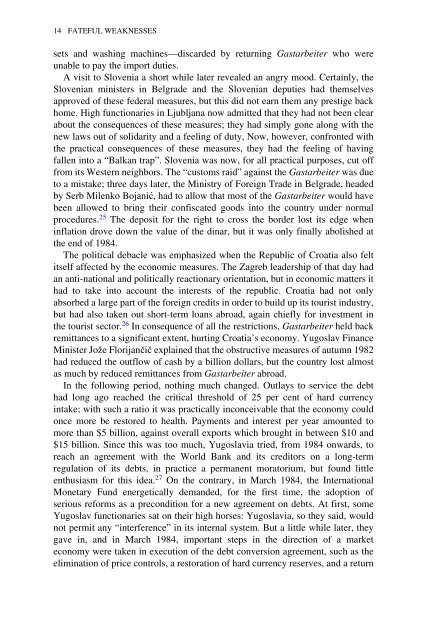Yugoslavia: A History of its Demise - Indymedia
Yugoslavia: A History of its Demise - Indymedia
Yugoslavia: A History of its Demise - Indymedia
You also want an ePaper? Increase the reach of your titles
YUMPU automatically turns print PDFs into web optimized ePapers that Google loves.
14 FATEFUL WEAKNESSES<br />
sets and washing machines—discarded by returning Gastarbeiter who were<br />
unable to pay the import duties.<br />
A visit to Slovenia a short while later revealed an angry mood. Certainly, the<br />
Slovenian ministers in Belgrade and the Slovenian deputies had themselves<br />
approved <strong>of</strong> these federal measures, but this did not earn them any prestige back<br />
home. High functionaries in Ljubljana now admitted that they had not been clear<br />
about the consequences <strong>of</strong> these measures; they had simply gone along with the<br />
new laws out <strong>of</strong> solidarity and a feeling <strong>of</strong> duty, Now, however, confronted with<br />
the practical consequences <strong>of</strong> these measures, they had the feeling <strong>of</strong> having<br />
fallen into a “Balkan trap”. Slovenia was now, for all practical purposes, cut <strong>of</strong>f<br />
from <strong>its</strong> Western neighbors. The “customs raid” against the Gastarbeiter was due<br />
to a mistake; three days later, the Ministry <strong>of</strong> Foreign Trade in Belgrade, headed<br />
by Serb Milenko Bojanić, had to allow that most <strong>of</strong> the Gastarbeiter would have<br />
been allowed to bring their confiscated goods into the country under normal<br />
procedures. 25 The deposit for the right to cross the border lost <strong>its</strong> edge when<br />
inflation drove down the value <strong>of</strong> the dinar, but it was only finally abolished at<br />
the end <strong>of</strong> 1984.<br />
The political debacle was emphasized when the Republic <strong>of</strong> Croatia also felt<br />
<strong>its</strong>elf affected by the economic measures. The Zagreb leadership <strong>of</strong> that day had<br />
an anti-national and politically reactionary orientation, but in economic matters it<br />
had to take into account the interests <strong>of</strong> the republic. Croatia had not only<br />
absorbed a large part <strong>of</strong> the foreign cred<strong>its</strong> in order to build up <strong>its</strong> tourist industry,<br />
but had also taken out short-term loans abroad, again chiefly for investment in<br />
the tourist sector. 26 In consequence <strong>of</strong> all the restrictions, Gastarbeiter held back<br />
remittances to a significant extent, hurting Croatia’s economy. Yugoslav Finance<br />
Minister Jože Florijančič explained that the obstructive measures <strong>of</strong> autumn 1982<br />
had reduced the outflow <strong>of</strong> cash by a billion dollars, but the country lost almost<br />
as much by reduced remittances from Gastarbeiter abroad.<br />
In the following period, nothing much changed. Outlays to service the debt<br />
had long ago reached the critical threshold <strong>of</strong> 25 per cent <strong>of</strong> hard currency<br />
intake; with such a ratio it was practically inconceivable that the economy could<br />
once more be restored to health. Payments and interest per year amounted to<br />
more than $5 billion, against overall exports which brought in between $10 and<br />
$15 billion. Since this was too much, <strong>Yugoslavia</strong> tried, from 1984 onwards, to<br />
reach an agreement with the World Bank and <strong>its</strong> creditors on a long-term<br />
regulation <strong>of</strong> <strong>its</strong> debts, in practice a permanent moratorium, but found little<br />
enthusiasm for this idea. 27 On the contrary, in March 1984, the International<br />
Monetary Fund energetically demanded, for the first time, the adoption <strong>of</strong><br />
serious reforms as a precondition for a new agreement on debts. At first, some<br />
Yugoslav functionaries sat on their high horses: <strong>Yugoslavia</strong>, so they said, would<br />
not permit any “interference” in <strong>its</strong> internal system. But a little while later, they<br />
gave in, and in March 1984, important steps in the direction <strong>of</strong> a market<br />
economy were taken in execution <strong>of</strong> the debt conversion agreement, such as the<br />
elimination <strong>of</strong> price controls, a restoration <strong>of</strong> hard currency reserves, and a return
















